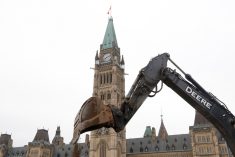Ottawa — The federal government has pushed ahead with an increase to the carbon tax despite continued calls from the agriculture sector for reprieve from the program.
The price on carbon rose from $20 per tonne to $30 per tonne effective April 1.
The federal Liberal government is standing firm on its commitment to increase the cost by $10 per tonne each year until 2030.
Grain Growers of Canada says the move increases uncertainty for farmers as they head for the fields this spring.
“You know, for Canadians, this could mean higher food prices at the grocery store at a time when we can all afford it the least,” said executive director Erin Gowriluk, adding costs increases will depend on the commodity. “For some commodities, it may be at the end of the day consumers who pay more. But for our members, for the most part, these costs can’t be passed down.”
Read Also

More Canadian companies at Agritechnica 2025
A record number of Canadian agriculture machinery and tech companies are at Agritechnica 2025, with exporters being more aggresive looking for new markets.
Some believed Ottawa would halt the scheduled tax increase due to the COVID-19 pandemic. Those expectations were arguably higher for the agriculture industry, as there were rumours stretching back to the end of 2019 that the Liberals were willing to make changes to offset the program’s impact on the sector.
Prime Minister Justin Trudeau ruled that out, repeating just days before the scheduled increase that the carbon pricing program includes rebates to those who pay into it.
“The price on pollution has been designed to put more money in household pockets, more money in the pockets of the middle class while we do the things that are necessary to fight pollution and protect our planet,” he said, telling reporters the need for the policy “remains even at a time of immediate crisis and pandemic.”
Gowriluk said her organization’s focus has been on mitigating the impact of COVID-19.
“There are issues right now that are more important and more pressing for our members than the carbon tax at this moment in time,” she said. “We felt we had gained some good momentum on this file.”
The GGC and other farm groups were supporting two pieces of proposed legislation — one in the Senate and one in the House of Commons — aimed at reducing the impact of carbon pricing on agriculture, prior to the suspension of Parliament as a result of COVID-19.
“We’re really pushing for ways to make sure that agriculture could remain competitive not only on the domestic market, but certainly on the on the global market,” said John Barlow, the Conservative critic in the Commons for agriculture and a proponent for one of the bills. “We want to see that expansion of the exemption to include natural gas and propane.”
Barlow said the federal government should at least take into account extra costs from carbon pricing in the context of the so-called “harvest from hell” and COVID-19, saying the pandemic offers a “perfect opportunity” for the Liberals to address the importance of success within agriculture.
“When you see all of these variables and these X-factors being piled on agriculture, you know, I don’t understand the logic,” he said, adding that raising taxes during a financial crisis is unwise.
“To me, it shows how out of touch and tone deaf they are.”
A recent report from the Parliamentary Budget Office (PBO), assuming social distancing and isolation measures remain in place for August, predicted real GDP to decline by 2.5 per cent in the first quarter of 2020, and 25 per cent in the second quarter.
The report also assumed members of the Organization of the Petroleum Exporting Countries (OPEC) and its partners won’t limit oil production and target nations — such as Canada — with balanced oil markets.
— D.C. Fraser reports for Glacier FarmMedia from Ottawa.















